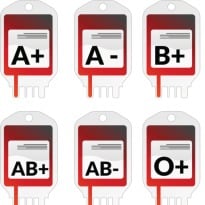Researchers have debunked the theory behind the popular blood-type diet - which claims an individual's nutritional needs vary by blood type. "Based on the data of 1,455 study participants, we found no evidence to support the 'blood-type' diet theory," said Ahmed El-Sohemy, associate professor at University of Toronto."The way an individual responds to any one of these diets has absolutely nothing to do with their blood type and has everything to do with their ability to stick to a sensible vegetarian or low-carbohydrate diet," added El-Sohemy.Researchers found that the associations they observed between each of the four blood-type (A, B, AB, O) diets and the markers of health are independent of the person's blood type.
According to an earlier theory popularised in the New York Times' best-seller book titled "Eat Right for Your Type", individuals adhering to a diet specific to one's blood type can improve health and decrease risk of chronic illness such as cardiovascular disease, said a study published in the journal PLoS One.The U of T researchers took an existing population of mostly young and healthy adults who provided detailed information about their usual diets and provided fasting blood.Diet scores were calculated based on the food items listed in 'Eat Right for Your Type' to determine relative adherence to each of the four 'blood-type' diets, the study added."There was just no evidence, one way or the other. We can now be confident in saying that the blood type diet hypothesis is false," said El-Sohemy.
According to an earlier theory popularised in the New York Times' best-seller book titled "Eat Right for Your Type", individuals adhering to a diet specific to one's blood type can improve health and decrease risk of chronic illness such as cardiovascular disease, said a study published in the journal PLoS One.The U of T researchers took an existing population of mostly young and healthy adults who provided detailed information about their usual diets and provided fasting blood.Diet scores were calculated based on the food items listed in 'Eat Right for Your Type' to determine relative adherence to each of the four 'blood-type' diets, the study added."There was just no evidence, one way or the other. We can now be confident in saying that the blood type diet hypothesis is false," said El-Sohemy.
Advertisement






